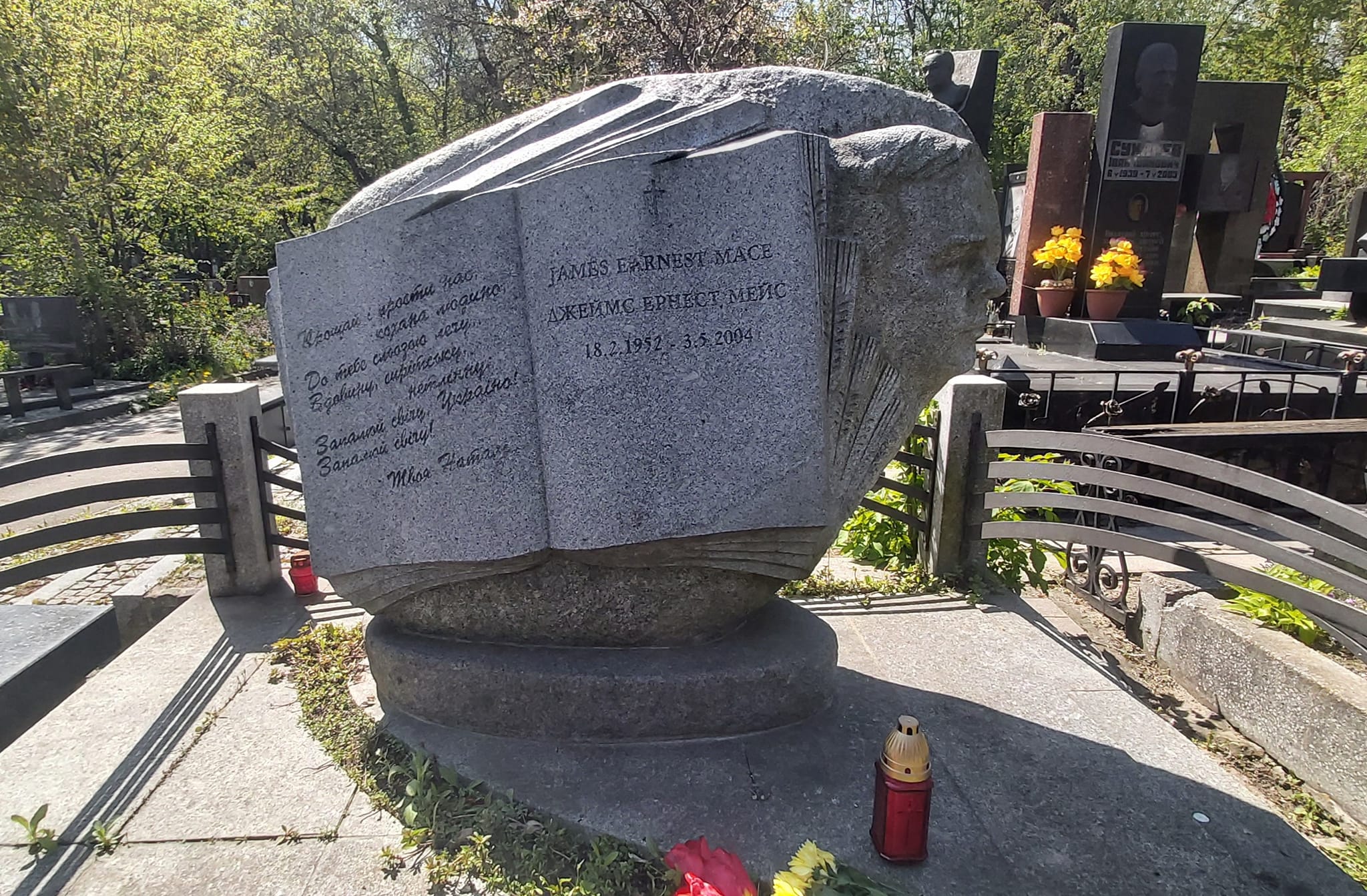Representatives of the Holodomor Museum honoured the memory of James Mace at his grave
Today is the day of remembrance of James Mace, an American historian and researcher of the Holodomor. He passed away on May 3, 2004. For many, this loss was a complete surprise at the time because Mace was only 52 years old.
On Wednesday, May 3, representatives of the Holodomor Museum visited the grave of the scholar at the Baikovo cemetery and honoured his memory: they laid flowers and lit a symbolic Mace candle. Volodymyr Koren, the sculptor of the tomb monument, also joined us.
“James Mace, a descendant of the brave Cherokee Indians, devoted his life to uncovering the truth about the genocide of Ukrainians,” said Andrii Ivanets, a leading researcher at the Museum. – He was one of the first in the world of academic science to call the Holodomor genocide in 1982 at a scientific conference in Israel. In 1985-1988, he headed the scientific part of the Commission of the US Congress on the Study of the Famine in Ukraine (sometimes it was even informally called the “Mace’s Commission”), which concluded the genocidal nature of the events of 1932-1933. This activity also required courage in the USA – the Slavic scientific environment of this country was under Soviet influence. It was hinted to James Mace that he had studied the history of the wrong people, and he could not find a permanent job for years afterwards.
In 1993 the scholar moved to Ukraine. Here he found his soulmate – his wife Natalia, became a professor at the Kyiv-Mohyla Academy, ran a regular column in the landmark newspaper “The Day”, and initiated the nationwide “Candle of Remembrance” campaign. Life seemed to have settled down. However, an unpleasant incident took place with him in Ukraine, which had a negative impact on his health. On May 3, 2004, at the age of only 52, the big heart of James Mace stopped beating… Professor, an expert in genocide studies Samuel Totten, who knew the scholar personally, believes this death was not accidental…”
Talking about the scale of Mace’s personality, Andrii Ivanets emphasized: “Back in the 90s, James Mace predicted that the fate of Europe would be decided in Ukraine. At that time it seemed strange, many did not understand him. But today we clearly see how prescient James Mace turned out to be. Because it is really in Ukraine today that the fate of Europe and the entire civilized world is being decided.”
“The fact that we still use James Mace’s work and constantly find something new in it proves that the researcher had a special, deep vision of historical processes and their dynamics. It is often even about prophetic things, in particular the current full-scale war, James Mace warned that Russia would seek to destroy Ukrainian statehood in the future. We should continue to study his works, listen to his thoughts. And most importantly, Mace would be happy to see Ukraine as a strong, independent state that has gotten rid of the negative Soviet legacy. Therefore, we must make efforts to build just such a state,” Mykhailo Kostiv, head of the Genocide, Crimes Against Humanity and War Crimes Research Department, emphasised.
Volodymyr Koren, a sculptor, told us about his idea, embodied in a monument to the outstanding historian: “James Mace owns the phrase “Your dead have chosen me.” Do you feel its depth? A shiver ran up my skin. So when I had the honour to make a monument on Mace’s grave, I had the following idea: he entered the atmosphere of Ukraine like a meteor and landed here. But before it burned, it had left a bright mark on the Ukrainian sky. The unfolded book in the foreground is precisely the symbol of his works and knowledge that he left us. I believe that this will not be the last monument to Mace, to which people will come with flowers and words of gratitude.”
Eternal peace and bright memory to the researcher born far from Ukraine but became a faithful defender and advocate of its tortured people.
We remember…
Photos by Lina Teslenko and Andrii Ivanets.
